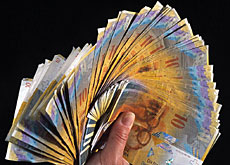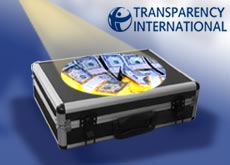Switzerland steps up fight against corruption

Switzerland is to introduce tougher anti-corruption regulations from October 1 that will make Swiss businesses liable for fraudulent practices.
Under the new law, any Swiss company operating abroad found guilty of dishonest dealings will be hit with a hefty fine of up to SFr5 million ($3.7 million).
The new law is part of ongoing Swiss efforts to clamp down on corrupt business practices.
Until now, only individuals found to have bribed foreign public officials could be prosecuted, facing up to five years in prison.
“We need to have strict rules and deter businesses [from overstepping] those rules,” David Syz, head of the State Secretariat for Economic Affairs (Seco), told swissinfo.
“The [new law] will also make it easier to prosecute those who passively accept corruption. No board member can say ‘I didn’t know what was happening in my company’. It’s their responsibility to monitor the goings-on.”
To coincide with the new regulations, Seco has brought out a booklet giving Swiss businesses with foreign operations advice on how to prevent corruption in all its forms, from bribery to nepotism.
Corporate transparency
The new booklet is expected to be of particular use to businesses active in developing countries, where, according to Syz, corporate transparency is particularly needed.
“We have to convince other countries that it is in their interest to have more transparency. Developing countries must open their markets and make them more transparent – it’s a win-win situation.”
Rolf Jeker, vice-president at a Geneva-based trade inspection company, SGS, says he has fought many instances of corruption – often unsuccessfully.
“We’ve had many cases with government tenders when we were clearly the front-runners in terms of quality and price, but our applications were dismissed out of hand, without explanation.”
Jeker says companies are increasingly trying to bring such types of corruption to the attention of the political authorities responsible, often through the World Bank or other financial institutions.
But ultimately, Jeker says the only way of beating corruption is by being way ahead of the competition in terms of price and quality.
Whistleblowers
Despite the latest measures, a number of organisations say a lot more needs to be done against corruption.
Transparency International (TI), a non-governmental organisation founded to fight global corruption, says Switzerland needs to ratify other anti-corruption treaties, such as an anti-corruption convention by the Council of Europe.
“This convention [due to be ratified next year] will help clamp down on corruption between two private individuals and help protect whistleblowers, who often take great personal risks in exposing corruption,” Philippe Lévy, head of TI Switzerland, told swissinfo.
TI’s 2002 survey of corruption in the public sector saw Switzerland ranked number 12 out of 102 countries polled.
swissinfo, Vanessa Mock
Under Swiss law, it is a criminal offence for individuals or companies to bribe a foreign public official.
In 2000, Switzerland ratified a convention by the Organisation for Economic Cooperation and Development (OECD) to make bribery of public officials a criminal offence.
Switzerland is due to ratify the Council of Europe’s anti-corruption convention next year.

In compliance with the JTI standards
More: SWI swissinfo.ch certified by the Journalism Trust Initiative

You can find an overview of ongoing debates with our journalists here. Please join us!
If you want to start a conversation about a topic raised in this article or want to report factual errors, email us at english@swissinfo.ch.